A Critical Analysis of the Canadian Healthcare System and IENs
VerifiedAdded on 2022/09/30
|7
|1575
|315
Discussion Board Post
AI Summary
This discussion post analyzes the Canadian healthcare system, addressing its current state of crisis and identifying key issues. It explores problems such as long wait times, the high cost of medication, and personnel shortages, linking these challenges to the system's origins in the 1960s and the evolving needs of a multicultural society. The post then examines the contributions of internationally educated nurses (IENs) to the Canadian healthcare system, highlighting their positive impacts in addressing nursing shortages and providing diverse skills, while also acknowledging challenges such as unequal pay, discrimination, and ethical concerns related to brain drain from developing countries. The post uses multiple references to support its arguments and concludes by suggesting that the Canadian healthcare system faces numerous challenges but still has room for improvement, and that ethical considerations are paramount in the recruitment of IENs.
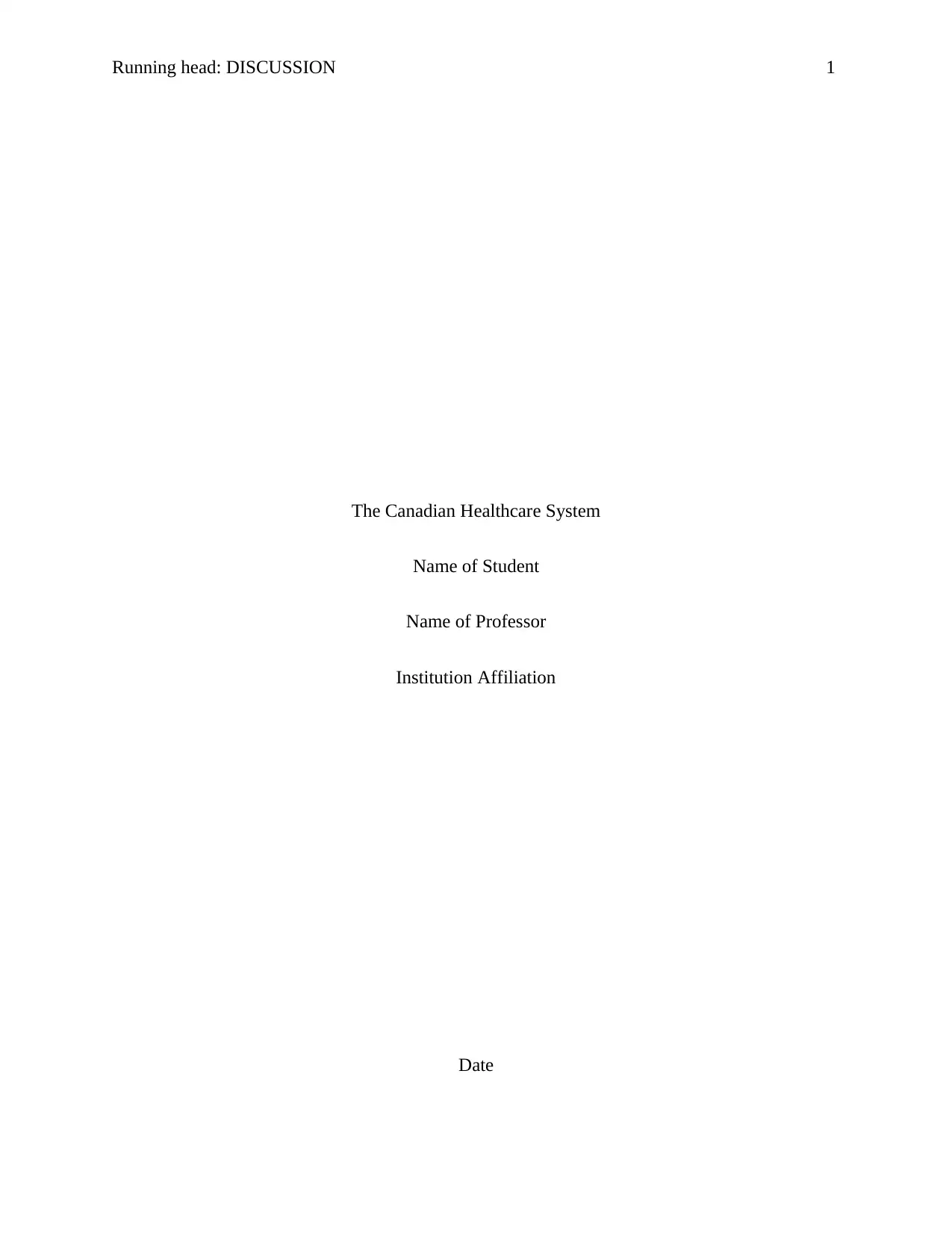
Running head: DISCUSSION 1
The Canadian Healthcare System
Name of Student
Name of Professor
Institution Affiliation
Date
The Canadian Healthcare System
Name of Student
Name of Professor
Institution Affiliation
Date
Paraphrase This Document
Need a fresh take? Get an instant paraphrase of this document with our AI Paraphraser
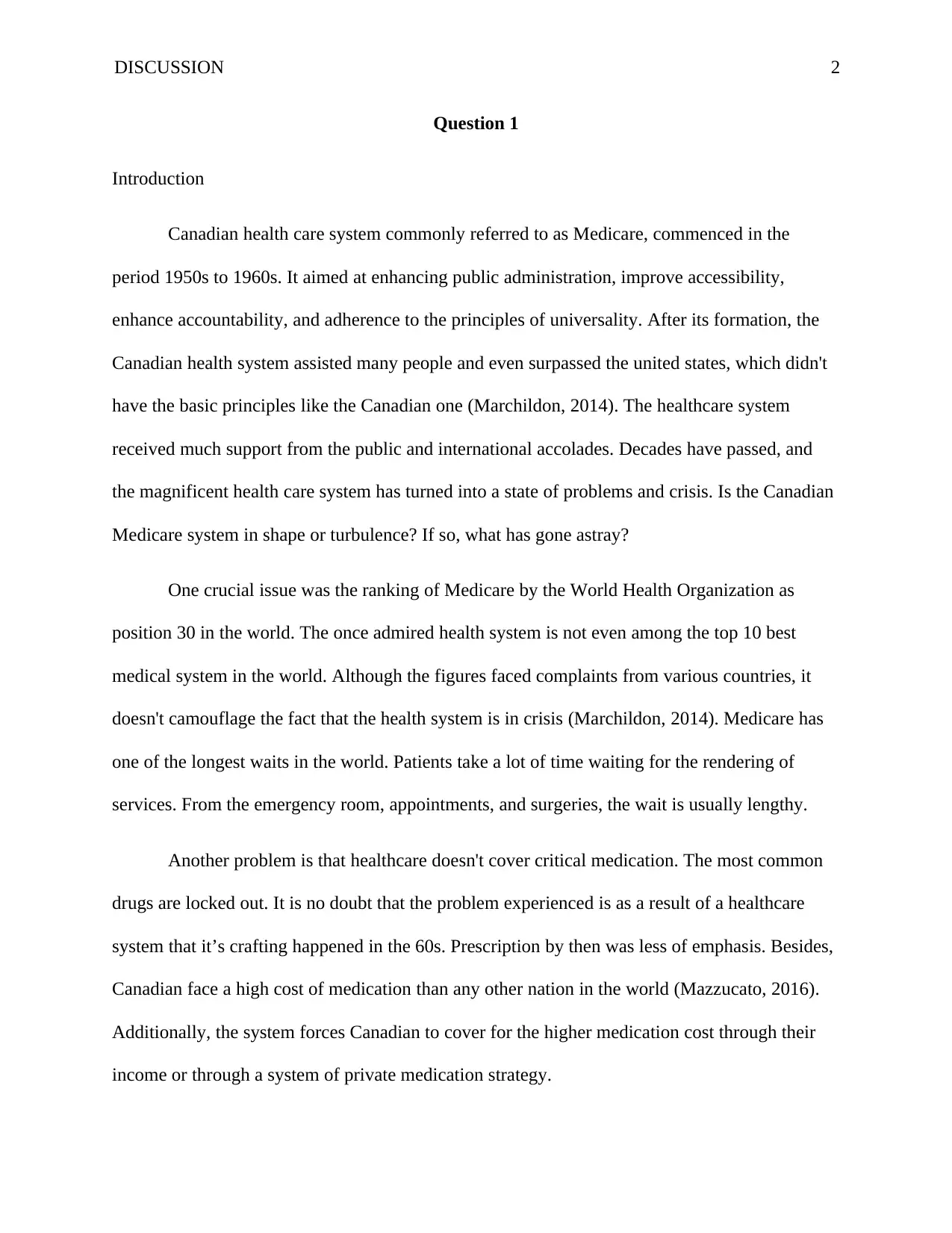
DISCUSSION 2
Question 1
Introduction
Canadian health care system commonly referred to as Medicare, commenced in the
period 1950s to 1960s. It aimed at enhancing public administration, improve accessibility,
enhance accountability, and adherence to the principles of universality. After its formation, the
Canadian health system assisted many people and even surpassed the united states, which didn't
have the basic principles like the Canadian one (Marchildon, 2014). The healthcare system
received much support from the public and international accolades. Decades have passed, and
the magnificent health care system has turned into a state of problems and crisis. Is the Canadian
Medicare system in shape or turbulence? If so, what has gone astray?
One crucial issue was the ranking of Medicare by the World Health Organization as
position 30 in the world. The once admired health system is not even among the top 10 best
medical system in the world. Although the figures faced complaints from various countries, it
doesn't camouflage the fact that the health system is in crisis (Marchildon, 2014). Medicare has
one of the longest waits in the world. Patients take a lot of time waiting for the rendering of
services. From the emergency room, appointments, and surgeries, the wait is usually lengthy.
Another problem is that healthcare doesn't cover critical medication. The most common
drugs are locked out. It is no doubt that the problem experienced is as a result of a healthcare
system that it’s crafting happened in the 60s. Prescription by then was less of emphasis. Besides,
Canadian face a high cost of medication than any other nation in the world (Mazzucato, 2016).
Additionally, the system forces Canadian to cover for the higher medication cost through their
income or through a system of private medication strategy.
Question 1
Introduction
Canadian health care system commonly referred to as Medicare, commenced in the
period 1950s to 1960s. It aimed at enhancing public administration, improve accessibility,
enhance accountability, and adherence to the principles of universality. After its formation, the
Canadian health system assisted many people and even surpassed the united states, which didn't
have the basic principles like the Canadian one (Marchildon, 2014). The healthcare system
received much support from the public and international accolades. Decades have passed, and
the magnificent health care system has turned into a state of problems and crisis. Is the Canadian
Medicare system in shape or turbulence? If so, what has gone astray?
One crucial issue was the ranking of Medicare by the World Health Organization as
position 30 in the world. The once admired health system is not even among the top 10 best
medical system in the world. Although the figures faced complaints from various countries, it
doesn't camouflage the fact that the health system is in crisis (Marchildon, 2014). Medicare has
one of the longest waits in the world. Patients take a lot of time waiting for the rendering of
services. From the emergency room, appointments, and surgeries, the wait is usually lengthy.
Another problem is that healthcare doesn't cover critical medication. The most common
drugs are locked out. It is no doubt that the problem experienced is as a result of a healthcare
system that it’s crafting happened in the 60s. Prescription by then was less of emphasis. Besides,
Canadian face a high cost of medication than any other nation in the world (Mazzucato, 2016).
Additionally, the system forces Canadian to cover for the higher medication cost through their
income or through a system of private medication strategy.
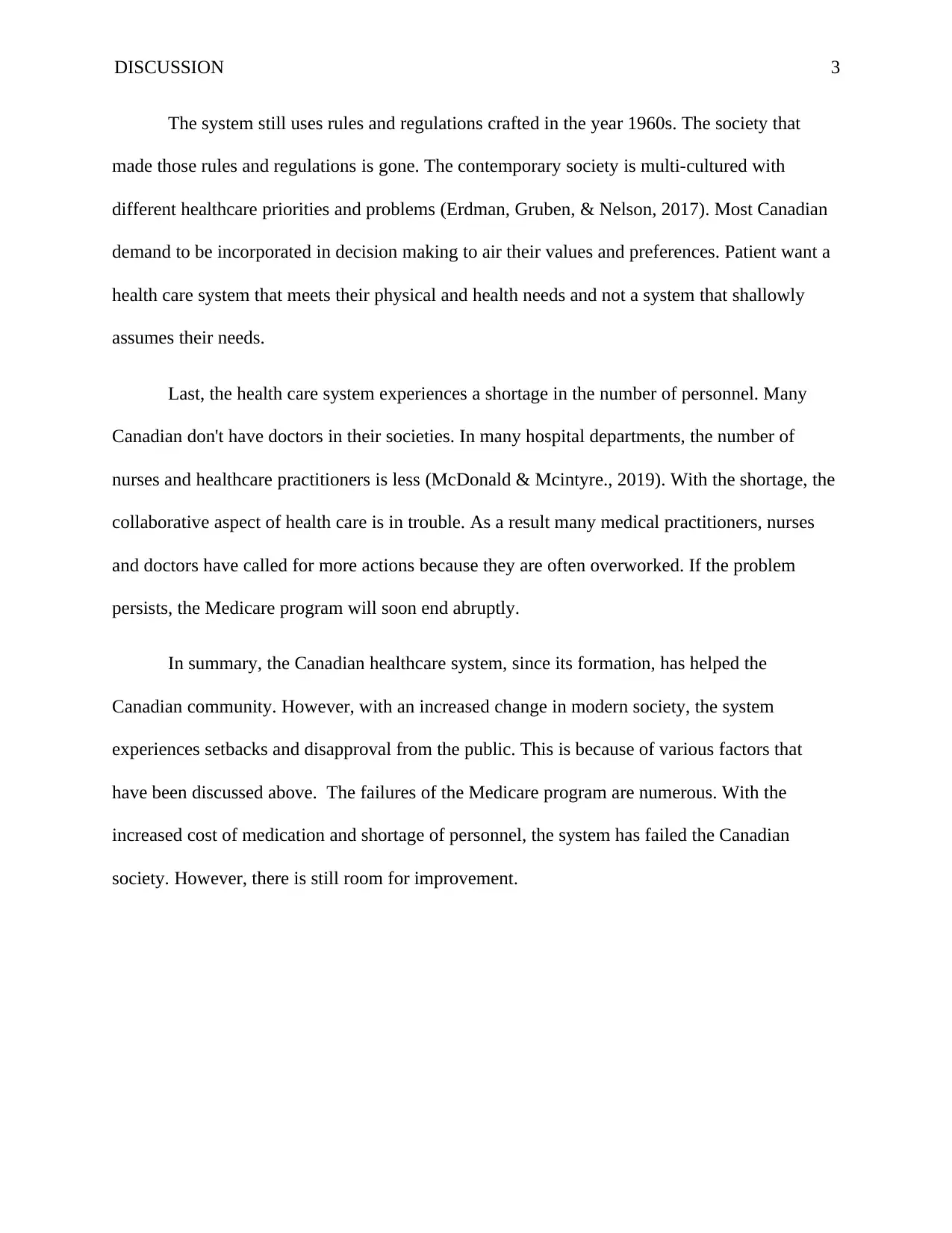
DISCUSSION 3
The system still uses rules and regulations crafted in the year 1960s. The society that
made those rules and regulations is gone. The contemporary society is multi-cultured with
different healthcare priorities and problems (Erdman, Gruben, & Nelson, 2017). Most Canadian
demand to be incorporated in decision making to air their values and preferences. Patient want a
health care system that meets their physical and health needs and not a system that shallowly
assumes their needs.
Last, the health care system experiences a shortage in the number of personnel. Many
Canadian don't have doctors in their societies. In many hospital departments, the number of
nurses and healthcare practitioners is less (McDonald & Mcintyre., 2019). With the shortage, the
collaborative aspect of health care is in trouble. As a result many medical practitioners, nurses
and doctors have called for more actions because they are often overworked. If the problem
persists, the Medicare program will soon end abruptly.
In summary, the Canadian healthcare system, since its formation, has helped the
Canadian community. However, with an increased change in modern society, the system
experiences setbacks and disapproval from the public. This is because of various factors that
have been discussed above. The failures of the Medicare program are numerous. With the
increased cost of medication and shortage of personnel, the system has failed the Canadian
society. However, there is still room for improvement.
The system still uses rules and regulations crafted in the year 1960s. The society that
made those rules and regulations is gone. The contemporary society is multi-cultured with
different healthcare priorities and problems (Erdman, Gruben, & Nelson, 2017). Most Canadian
demand to be incorporated in decision making to air their values and preferences. Patient want a
health care system that meets their physical and health needs and not a system that shallowly
assumes their needs.
Last, the health care system experiences a shortage in the number of personnel. Many
Canadian don't have doctors in their societies. In many hospital departments, the number of
nurses and healthcare practitioners is less (McDonald & Mcintyre., 2019). With the shortage, the
collaborative aspect of health care is in trouble. As a result many medical practitioners, nurses
and doctors have called for more actions because they are often overworked. If the problem
persists, the Medicare program will soon end abruptly.
In summary, the Canadian healthcare system, since its formation, has helped the
Canadian community. However, with an increased change in modern society, the system
experiences setbacks and disapproval from the public. This is because of various factors that
have been discussed above. The failures of the Medicare program are numerous. With the
increased cost of medication and shortage of personnel, the system has failed the Canadian
society. However, there is still room for improvement.
⊘ This is a preview!⊘
Do you want full access?
Subscribe today to unlock all pages.

Trusted by 1+ million students worldwide
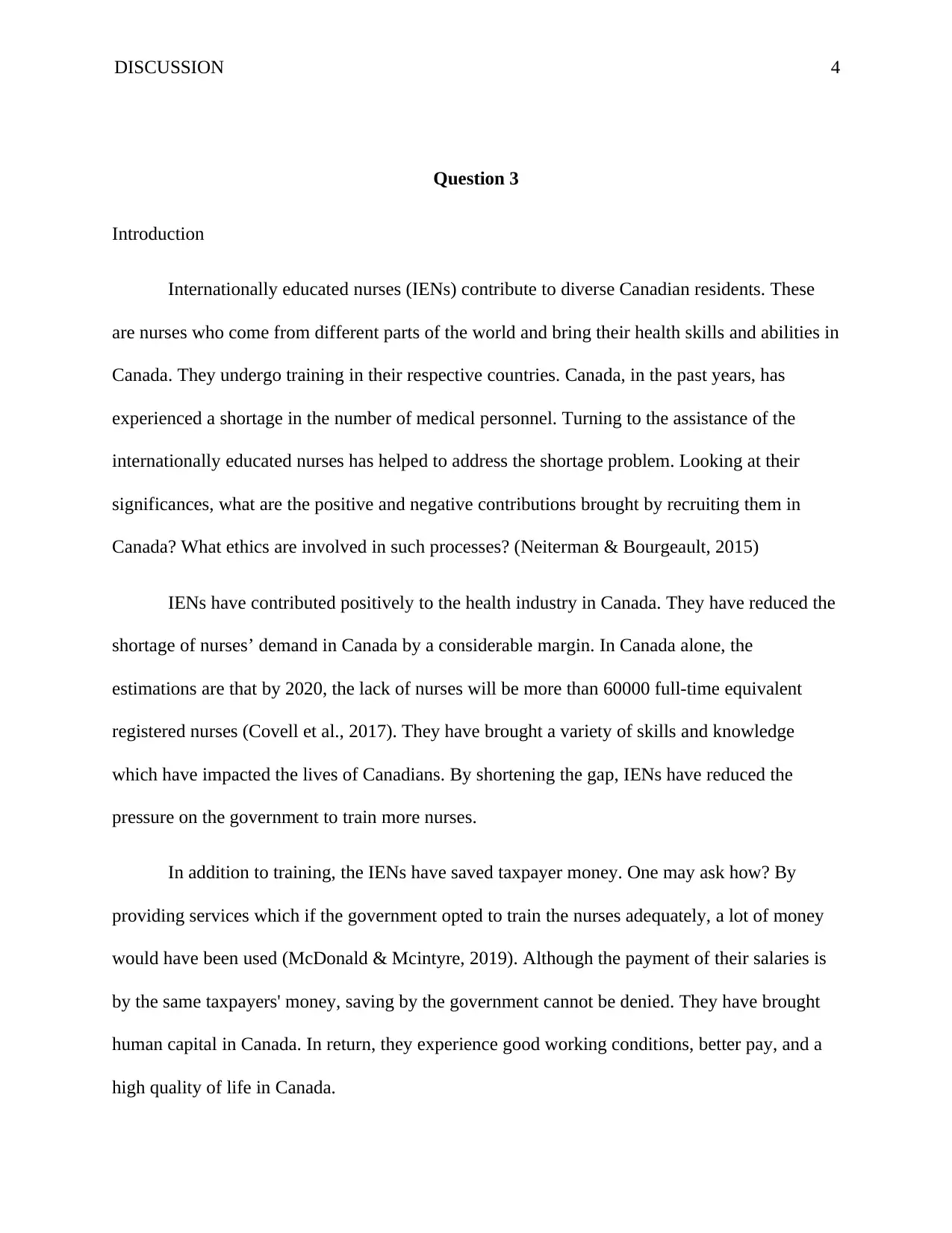
DISCUSSION 4
Question 3
Introduction
Internationally educated nurses (IENs) contribute to diverse Canadian residents. These
are nurses who come from different parts of the world and bring their health skills and abilities in
Canada. They undergo training in their respective countries. Canada, in the past years, has
experienced a shortage in the number of medical personnel. Turning to the assistance of the
internationally educated nurses has helped to address the shortage problem. Looking at their
significances, what are the positive and negative contributions brought by recruiting them in
Canada? What ethics are involved in such processes? (Neiterman & Bourgeault, 2015)
IENs have contributed positively to the health industry in Canada. They have reduced the
shortage of nurses’ demand in Canada by a considerable margin. In Canada alone, the
estimations are that by 2020, the lack of nurses will be more than 60000 full-time equivalent
registered nurses (Covell et al., 2017). They have brought a variety of skills and knowledge
which have impacted the lives of Canadians. By shortening the gap, IENs have reduced the
pressure on the government to train more nurses.
In addition to training, the IENs have saved taxpayer money. One may ask how? By
providing services which if the government opted to train the nurses adequately, a lot of money
would have been used (McDonald & Mcintyre, 2019). Although the payment of their salaries is
by the same taxpayers' money, saving by the government cannot be denied. They have brought
human capital in Canada. In return, they experience good working conditions, better pay, and a
high quality of life in Canada.
Question 3
Introduction
Internationally educated nurses (IENs) contribute to diverse Canadian residents. These
are nurses who come from different parts of the world and bring their health skills and abilities in
Canada. They undergo training in their respective countries. Canada, in the past years, has
experienced a shortage in the number of medical personnel. Turning to the assistance of the
internationally educated nurses has helped to address the shortage problem. Looking at their
significances, what are the positive and negative contributions brought by recruiting them in
Canada? What ethics are involved in such processes? (Neiterman & Bourgeault, 2015)
IENs have contributed positively to the health industry in Canada. They have reduced the
shortage of nurses’ demand in Canada by a considerable margin. In Canada alone, the
estimations are that by 2020, the lack of nurses will be more than 60000 full-time equivalent
registered nurses (Covell et al., 2017). They have brought a variety of skills and knowledge
which have impacted the lives of Canadians. By shortening the gap, IENs have reduced the
pressure on the government to train more nurses.
In addition to training, the IENs have saved taxpayer money. One may ask how? By
providing services which if the government opted to train the nurses adequately, a lot of money
would have been used (McDonald & Mcintyre, 2019). Although the payment of their salaries is
by the same taxpayers' money, saving by the government cannot be denied. They have brought
human capital in Canada. In return, they experience good working conditions, better pay, and a
high quality of life in Canada.
Paraphrase This Document
Need a fresh take? Get an instant paraphrase of this document with our AI Paraphraser
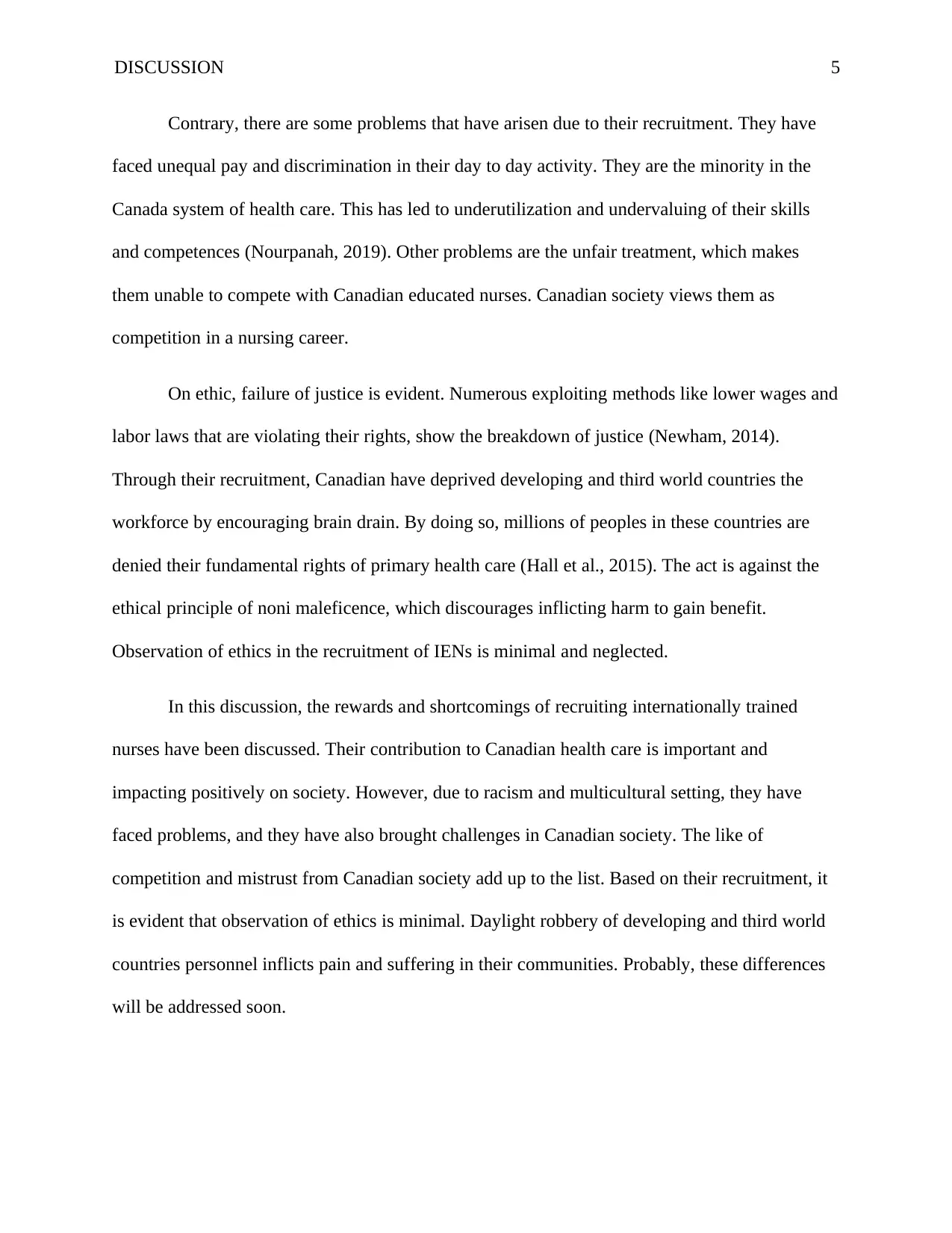
DISCUSSION 5
Contrary, there are some problems that have arisen due to their recruitment. They have
faced unequal pay and discrimination in their day to day activity. They are the minority in the
Canada system of health care. This has led to underutilization and undervaluing of their skills
and competences (Nourpanah, 2019). Other problems are the unfair treatment, which makes
them unable to compete with Canadian educated nurses. Canadian society views them as
competition in a nursing career.
On ethic, failure of justice is evident. Numerous exploiting methods like lower wages and
labor laws that are violating their rights, show the breakdown of justice (Newham, 2014).
Through their recruitment, Canadian have deprived developing and third world countries the
workforce by encouraging brain drain. By doing so, millions of peoples in these countries are
denied their fundamental rights of primary health care (Hall et al., 2015). The act is against the
ethical principle of noni maleficence, which discourages inflicting harm to gain benefit.
Observation of ethics in the recruitment of IENs is minimal and neglected.
In this discussion, the rewards and shortcomings of recruiting internationally trained
nurses have been discussed. Their contribution to Canadian health care is important and
impacting positively on society. However, due to racism and multicultural setting, they have
faced problems, and they have also brought challenges in Canadian society. The like of
competition and mistrust from Canadian society add up to the list. Based on their recruitment, it
is evident that observation of ethics is minimal. Daylight robbery of developing and third world
countries personnel inflicts pain and suffering in their communities. Probably, these differences
will be addressed soon.
Contrary, there are some problems that have arisen due to their recruitment. They have
faced unequal pay and discrimination in their day to day activity. They are the minority in the
Canada system of health care. This has led to underutilization and undervaluing of their skills
and competences (Nourpanah, 2019). Other problems are the unfair treatment, which makes
them unable to compete with Canadian educated nurses. Canadian society views them as
competition in a nursing career.
On ethic, failure of justice is evident. Numerous exploiting methods like lower wages and
labor laws that are violating their rights, show the breakdown of justice (Newham, 2014).
Through their recruitment, Canadian have deprived developing and third world countries the
workforce by encouraging brain drain. By doing so, millions of peoples in these countries are
denied their fundamental rights of primary health care (Hall et al., 2015). The act is against the
ethical principle of noni maleficence, which discourages inflicting harm to gain benefit.
Observation of ethics in the recruitment of IENs is minimal and neglected.
In this discussion, the rewards and shortcomings of recruiting internationally trained
nurses have been discussed. Their contribution to Canadian health care is important and
impacting positively on society. However, due to racism and multicultural setting, they have
faced problems, and they have also brought challenges in Canadian society. The like of
competition and mistrust from Canadian society add up to the list. Based on their recruitment, it
is evident that observation of ethics is minimal. Daylight robbery of developing and third world
countries personnel inflicts pain and suffering in their communities. Probably, these differences
will be addressed soon.
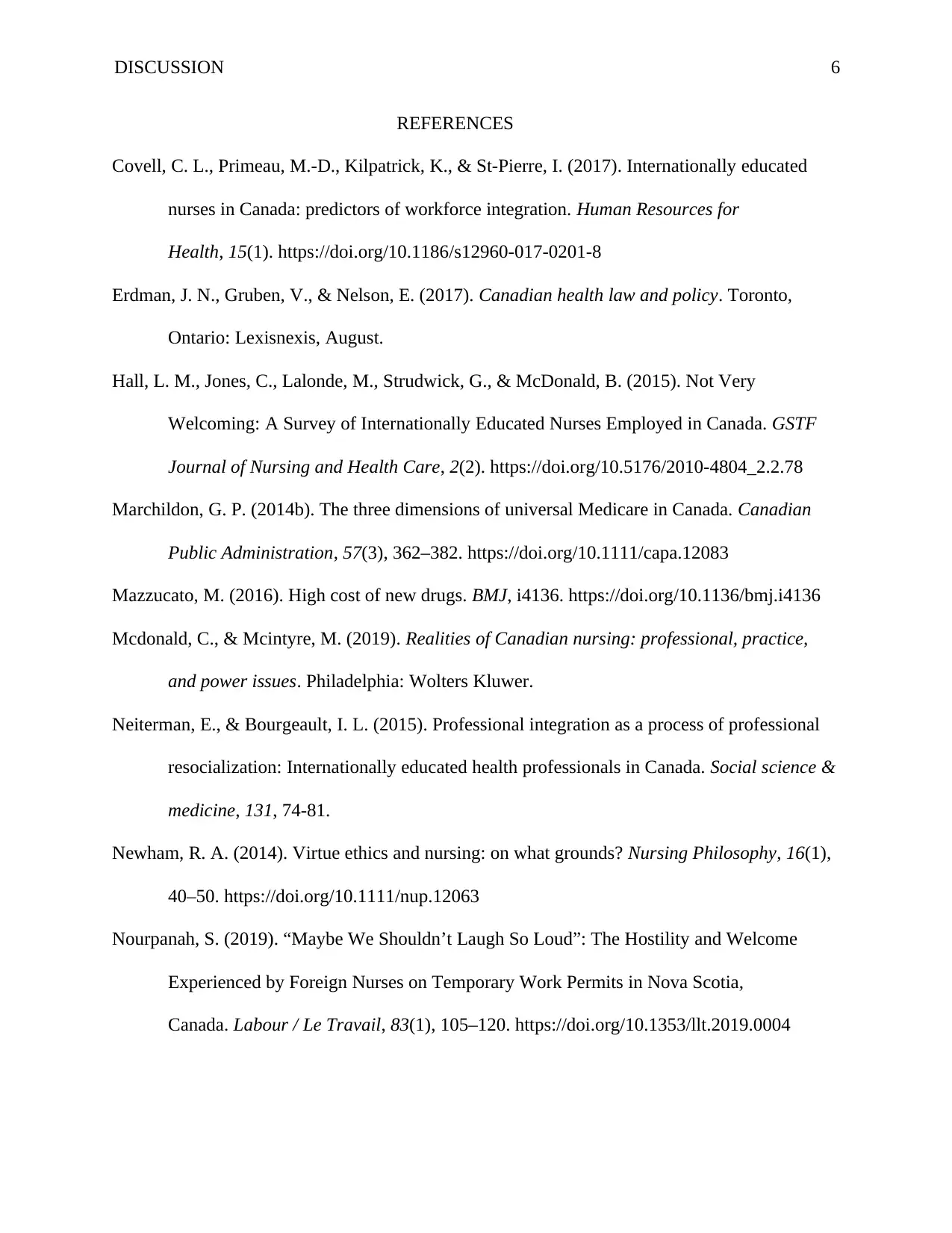
DISCUSSION 6
REFERENCES
Covell, C. L., Primeau, M.-D., Kilpatrick, K., & St-Pierre, I. (2017). Internationally educated
nurses in Canada: predictors of workforce integration. Human Resources for
Health, 15(1). https://doi.org/10.1186/s12960-017-0201-8
Erdman, J. N., Gruben, V., & Nelson, E. (2017). Canadian health law and policy. Toronto,
Ontario: Lexisnexis, August.
Hall, L. M., Jones, C., Lalonde, M., Strudwick, G., & McDonald, B. (2015). Not Very
Welcoming: A Survey of Internationally Educated Nurses Employed in Canada. GSTF
Journal of Nursing and Health Care, 2(2). https://doi.org/10.5176/2010-4804_2.2.78
Marchildon, G. P. (2014b). The three dimensions of universal Medicare in Canada. Canadian
Public Administration, 57(3), 362–382. https://doi.org/10.1111/capa.12083
Mazzucato, M. (2016). High cost of new drugs. BMJ, i4136. https://doi.org/10.1136/bmj.i4136
Mcdonald, C., & Mcintyre, M. (2019). Realities of Canadian nursing: professional, practice,
and power issues. Philadelphia: Wolters Kluwer.
Neiterman, E., & Bourgeault, I. L. (2015). Professional integration as a process of professional
resocialization: Internationally educated health professionals in Canada. Social science &
medicine, 131, 74-81.
Newham, R. A. (2014). Virtue ethics and nursing: on what grounds? Nursing Philosophy, 16(1),
40–50. https://doi.org/10.1111/nup.12063
Nourpanah, S. (2019). “Maybe We Shouldn’t Laugh So Loud”: The Hostility and Welcome
Experienced by Foreign Nurses on Temporary Work Permits in Nova Scotia,
Canada. Labour / Le Travail, 83(1), 105–120. https://doi.org/10.1353/llt.2019.0004
REFERENCES
Covell, C. L., Primeau, M.-D., Kilpatrick, K., & St-Pierre, I. (2017). Internationally educated
nurses in Canada: predictors of workforce integration. Human Resources for
Health, 15(1). https://doi.org/10.1186/s12960-017-0201-8
Erdman, J. N., Gruben, V., & Nelson, E. (2017). Canadian health law and policy. Toronto,
Ontario: Lexisnexis, August.
Hall, L. M., Jones, C., Lalonde, M., Strudwick, G., & McDonald, B. (2015). Not Very
Welcoming: A Survey of Internationally Educated Nurses Employed in Canada. GSTF
Journal of Nursing and Health Care, 2(2). https://doi.org/10.5176/2010-4804_2.2.78
Marchildon, G. P. (2014b). The three dimensions of universal Medicare in Canada. Canadian
Public Administration, 57(3), 362–382. https://doi.org/10.1111/capa.12083
Mazzucato, M. (2016). High cost of new drugs. BMJ, i4136. https://doi.org/10.1136/bmj.i4136
Mcdonald, C., & Mcintyre, M. (2019). Realities of Canadian nursing: professional, practice,
and power issues. Philadelphia: Wolters Kluwer.
Neiterman, E., & Bourgeault, I. L. (2015). Professional integration as a process of professional
resocialization: Internationally educated health professionals in Canada. Social science &
medicine, 131, 74-81.
Newham, R. A. (2014). Virtue ethics and nursing: on what grounds? Nursing Philosophy, 16(1),
40–50. https://doi.org/10.1111/nup.12063
Nourpanah, S. (2019). “Maybe We Shouldn’t Laugh So Loud”: The Hostility and Welcome
Experienced by Foreign Nurses on Temporary Work Permits in Nova Scotia,
Canada. Labour / Le Travail, 83(1), 105–120. https://doi.org/10.1353/llt.2019.0004
⊘ This is a preview!⊘
Do you want full access?
Subscribe today to unlock all pages.

Trusted by 1+ million students worldwide
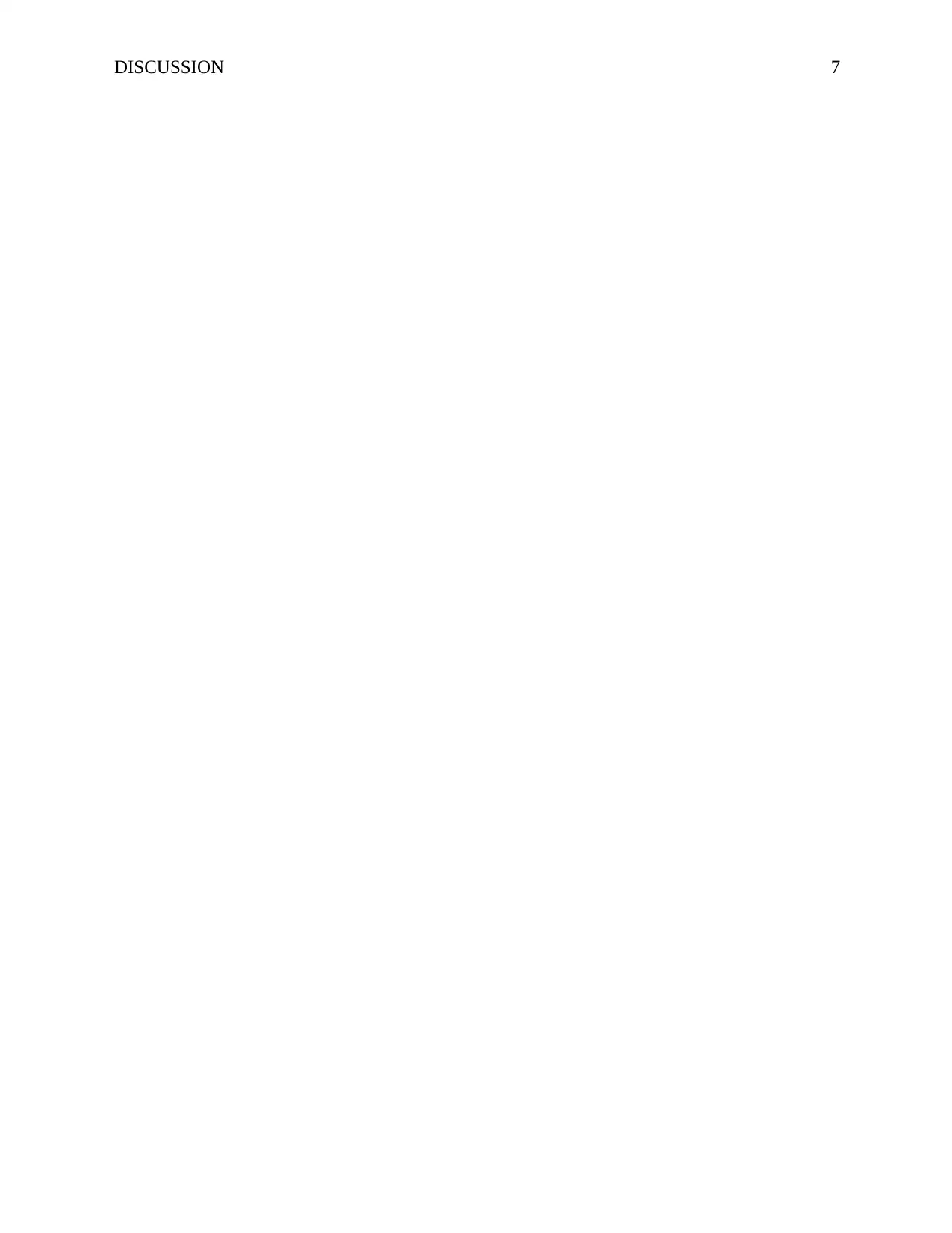
DISCUSSION 7
1 out of 7
Related Documents
Your All-in-One AI-Powered Toolkit for Academic Success.
+13062052269
info@desklib.com
Available 24*7 on WhatsApp / Email
![[object Object]](/_next/static/media/star-bottom.7253800d.svg)
Unlock your academic potential
Copyright © 2020–2026 A2Z Services. All Rights Reserved. Developed and managed by ZUCOL.




